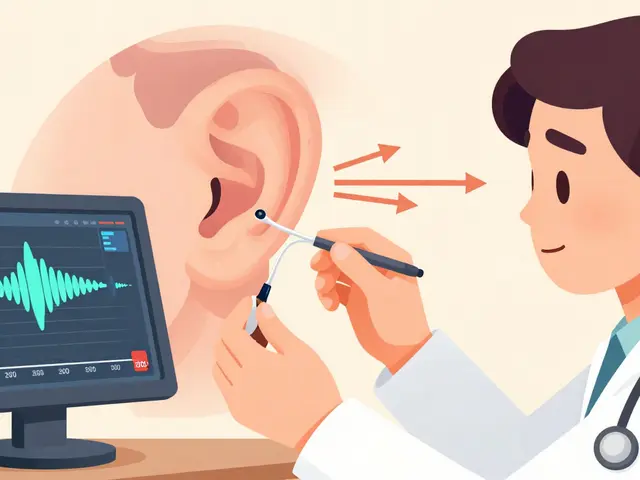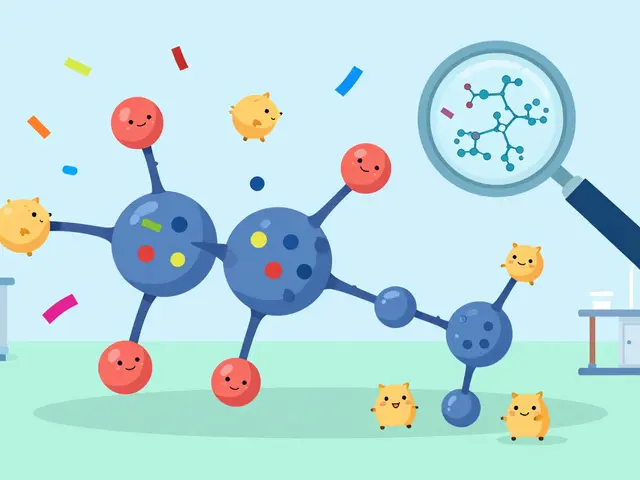
Waking up tired, struggling with brain fog, or watching your hair thin despite religiously taking your levothyroxine? If any of this sounds familiar, you’re not alone. Millions with hypothyroidism still don’t feel their best after starting thyroid meds. While no papaya smoothie or magic pill can replace your prescription, there’s a buzz right now around natural ways to support thyroid function, right along with what the doctor ordered. What’s hype, what truly helps, and what are docs actually telling their patients?
The Power of Food: Eating for Thyroid Support
When you hear the phrase “thyroid-friendly diet,” you might picture a list of foods as long as your arm—some you’ve never heard of, others you wish you could avoid. But the truth is, what you eat has a direct line to how your thyroid behaves, and there’s real science to it. Doctors see this every day: patients who tweak what’s on their plate often report more energy, better skin, and even weight changes, even when they’re still on levothyroxine.
Let’s talk goitrogens—the plant compounds that can slow your thyroid if you have them in massive amounts. Think big bowls of raw kale, cabbage, or Brussels sprouts. If you like cruciferous veggies, don’t skip them altogether; just cook them! Heat tames their goitrogenic nature. Real-life? Nobody got hypothyroid from a salad bowl—unless your idea of a salad is half a field’s worth of raw broccoli every day.
Your thyroid also loves iodine, but too much is just as bad as too little. Many doctors now suggest getting iodine from natural sources like seaweed snacks, a sprinkle of iodized salt, and fish—especially if you’re not juggling other thyroid meds that might change your needs. Eggs, dairy, and seafood bring in not only iodine but selenium, zinc, and vitamin D, too. These nutrients pop up again and again in research as essentials for a healthy thyroid. In fact, a clinical study published last year on over 400 hypothyroid patients found those with higher selenium and zinc in their blood had fewer symptoms like fatigue and dry skin—even with the same thyroid hormone dose as others.
Don’t fall into the trap of sugar-laden breakfast cereals or processed snack bars, though. Many processed foods pack in hidden ingredients that mess with your mood, gut, and, ultimately, how levothyroxine works. Dieticians recommend focusing on whole, unprocessed foods. Swap boxed breakfast for eggs with spinach, try grilled salmon for lunch, and opt for Greek yogurt with berries for a snack. It’s boring advice, but you’ll notice the difference if you actually stick to it for a month—not just in labs, but in how you feel getting out of bed.
Some patients ask about “thyroid detox” cleanses or juice fasts. Doctors rarely back them. Why? Most cleanse plans drop calories way too low and leave you missing out on the protein, fats, and micronutrients your thyroid needs. You’re better off fueling your metabolism with smart, steady meals than hopping on the latest Instagram cleanse trend.
Supplements: Science-Backed or Overhyped?
If you’ve gone to a health store lately, you’ve seen a wall of bottles promising a perfect thyroid. But supplements aren’t one-size-fits-all, so let’s set the record straight: certain nutrients can help, but others waste your money—or worse, clash with your meds.
Selenium is a heavy hitter here. Multiple clinical trials have found that people with Hashimoto’s (the most common form of hypothyroidism) who take selenium supplements feel less fatigue and have lower markers of inflammation. The best dose is around 200 mcg daily—higher and you risk side effects. Brazil nuts are nature’s richest source, but one or two nuts a day is enough. Don’t go wild; too much selenium can make you sick, give you hair loss, or even mess with your heart rhythm.
Zinc is another mineral your thyroid craves. It helps convert T4 (what’s in your thyroid pill) to T3, the hormone your cells actually use. Supplementing with 20-40 mg a day may help if your blood zinc is low, which is especially common in people who avoid red meat or shellfish. But, like with selenium, more isn’t better—you can actually bring on deficiencies in copper or iron if you overdo it.
What about iodine pills? Unless you’re living somewhere with known iodine deficiency or have a restrictive diet (like vegan with no iodized salt or seaweed), most North Americans get enough. Excess iodine can actually make thyroid issues worse, especially if you’re already on levothyroxine.
Vitamin D is the unsung hero for most thyroid patients. A large review in 2023 showed people with hypothyroidism often have lower vitamin D levels, and simply getting those levels up can mean less tiredness and less joint pain. A daily dose of 1000-2000 IU is safe, but your best bet is a quick blood test to dial it in. Sunlight counts too, but don’t count on a tan to do all the work.
Iron and B vitamins deserve a shout-out. Iron is key for thyroid hormone production, but it’s tricky—iron supplements clash with levothyroxine if you take them together. Docs usually tell patients to separate their thyroid pill from their multivitamin, iron, or calcium by at least four hours for full absorption. Don’t forget this step; it really matters.
There’s a lot of hype around “thyroid boosting” blends with things like ashwagandha, guggul, or L-tyrosine. Some may gently support thyroid function or reduce stress, but they’re not a stand-in for real medication or targeted nutrients. Plus, pills marked as “natural” aren’t always safe or regulated, so stick with brands your doctor trusts, not whatever’s trending online today.

Herbal and Lifestyle Approaches: Complement Levothyroxine Safely
Alongside diet and standard supplements, doctors sometimes recommend gentle herbal support—you just have to be smart about which ones, and not every herb is right for everyone.
Ashwagandha, for instance, is a favorite in the world of adaptogens. A randomized clinical trial published in 2022 showed that people with mild hypothyroidism who took ashwagandha root extract had measurable improvements in thyroid hormone levels, and an energy boost, compared to placebo. But here’s the thing: It’s not a cure, and folks with autoimmune thyroid problems or who are pregnant should consult their doctor to avoid overactivation or risk.
Guggul, a resin from the Commiphora plant, has centuries-old support from Ayurvedic medicine. Some small studies suggest it may nudge up thyroid hormone activity, which could help some with sluggish thyroids. Still, larger studies are needed for safety, especially if you’re also on levothyroxine.
Rhodiola and holy basil are two other herbs doctors sometimes suggest—not to change thyroid levels directly, but to buffer the stress that wears you down when you’re dealing with chronic illness. Lower stress means steadier hormone output from your whole body, thyroid included.
Simple lifestyle hacks pack just as much punch as any pill. Regular movement—even moderate walks—can smooth out your metabolism, improve sleep, and lift mood. And while high-intensity workouts can be great, people with thyroid imbalances sometimes find they’re wiped out too easily, so pacing and listening to your body is key. Gentle yoga or stretching also helps, balancing your nervous system and dialing down the inflammation that can mess with thyroid signals.
Sleep, that old cliché, really is medicine. One revealing study out of the Cleveland Clinic found that hypothyroid patients who got 7-8 hours a night saw steadier TSH (thyroid-stimulating hormone) levels the next morning compared to those who cut sleep short. Easy lifestyle changes like winding down early, limiting screen time late, and sleeping in a cool, dark room can make a genuine difference—no herbal teas or pill bottles required.
For those hunting even more natural tweaks, acupuncture and mindfulness-based stress reduction are gaining traction among integrative docs. They’re not direct thyroid cures, but they sure help with the fatigue, aches, and anxiety that often ride along with hypothyroidism.
Complementing Levothyroxine: Doctor-Approved Strategies and Cautions
You might spot headlines claiming there are natural alternatives to Synthroid, but the experts are clear: for most, levothyroxine is still the anchor of hypothyroidism treatment. What’s changing in 2025? Doctors are talking more openly about all the extras—diet, nutrients, herbal aids—that can help get everything else in your body back on track while your prescription does its job. Want examples? Here’s what top endocrinologists are actually sharing with patients these days.
- Take levothyroxine first thing in the morning, on an empty stomach. Even coffee or calcium-rich foods can partly block absorption. Wait at least 30-60 minutes before you eat.
- Space out supplements like iron or calcium from your thyroid pill by at least four hours—it matters more than most people think.
- Go for regular blood work, not just once a year. Thyroid needs, and absorption, can change with diet, new medications, or even big life changes like pregnancy or menopause.
- If you want to try herbal formulas, loop in your health provider first. Herbs can change how your thyroid—or your medication—reacts.
- Track not just your lab numbers but your actual energy, sleep, and mood over time. Sometimes, the best tip is the one you discover by paying close attention to your own body.
- When symptom control isn’t perfect, or you’re curious about updates on thyroid med options, check guides like natural alternatives to Synthroid—it’s refreshing to see honest comparisons and emerging research all in one place.
Doctors are moving toward a more personalized approach. People are unique: some gluten-free for celiac, others focusing on Mediterranean diets, some thriving with more or less animal protein. Working alongside your healthcare team, you can find a rhythm—food, supplements, maybe some movement or herbs—that truly supports your thyroid.
Just remember: don’t drop or adjust your prescribed medication based on something you read online. It’s always best to partner closely with your provider when shifting anything major, whether that’s swapping supplements, trying a new herbal tea, or reworking your whole plate. Get curious, but stay grounded.
Feeling better often means blending the best of both worlds—science-backed medicine with old-school nutrition and a few lifestyle tweaks. The right mix can turn “good enough” into something way better. With new research rolling out each year and patient stories piling up, there’s hope for even the most stubborn symptoms. Keep asking questions, keep tracking what works for you, and before long, you might just feel like yourself again.




Stephen Adeyanju
July 31, 2025 AT 14:35Bro i took ashwagandha for 3 weeks and my TSH dropped like a rock i swear to god i didnt even change my meds just started chugging that root powder like its holy water and now i can run without feeling like a wet sock
james thomas
August 1, 2025 AT 15:48Of course you could run now you absolute peasant. You just swallowed some hippie dirt because you're too lazy to get your T3 levels checked properly. Real medicine isn't some Instagram guru's 'thyroid cleanse' with turmeric and tears. You're lucky you didn't trigger a thyroid storm from all that iodine-rich seaweed you're probably snacking on like a squirrel. Go get a real blood panel before you start preaching to the masses.
Deborah Williams
August 3, 2025 AT 09:09It's funny how we treat our bodies like broken machines that need a firmware update, when really we're just asking them to survive in a world that's been designed to exhaust them. Maybe the real thyroid problem isn't your iodine intake-it's the fact that you're still awake at 2am scrolling through supplement reviews instead of sleeping. The body doesn't need more pills. It needs silence.
Kaushik Das
August 3, 2025 AT 15:11Man I live in Delhi and we’ve been using ashwagandha since my grandma’s time-like, it’s in our chai, our laddoos, even our wedding rituals. But here’s the twist: we never took it alone. Always with ghee, sometimes with black pepper, always with a good nap after. No one here thinks it’s a magic bullet. It’s part of rhythm. Maybe that’s the real secret-not the supplement, but the lifestyle it sits inside. 🙏
Asia Roveda
August 4, 2025 AT 23:19Anyone who takes selenium supplements without a blood test is just giving their liver a vacation from detoxing. This whole 'natural thyroid' movement is just Big Wellness selling fear to people who don’t trust their doctors. And let’s be real-your doctor doesn’t want you to feel better. They want you dependent. You think they profit from you eating salmon and sleeping 8 hours? No. They profit from your refill receipts.
Sanjay Menon
August 6, 2025 AT 04:15Let me be the first to say this: the fact that we’re even having this conversation means our healthcare system has failed us. We’re not just treating hypothyroidism-we’re treating capitalism’s side effect. The modern body is a battlefield of cortisol, glyphosate, and unregulated herbal blends. Ashwagandha isn’t the answer. A living wage, paid leave, and a 30-minute lunch break are. But no one sells that on Amazon.
Cynthia Springer
August 7, 2025 AT 08:11Wait, so if I’m taking levothyroxine and I eat a bowl of kale salad for lunch, I’m not going to turn into a human rock? I’ve been terrified of cruciferous veggies since 2018. Also, how long should I wait after my pill before I drink coffee? I’ve been doing it at the same time because I’m lazy and also I like my morning ritual.
Brittany Medley
August 7, 2025 AT 14:58For anyone reading this and feeling overwhelmed: start with one thing. Maybe it’s taking your pill before coffee. Maybe it’s adding one egg to your breakfast. Maybe it’s turning off your phone an hour before bed. You don’t need to overhaul your life overnight. Tiny changes, consistently made, are the quiet revolution thyroid patients don’t talk about enough.
Rachel Whip
August 8, 2025 AT 02:38Iron and levothyroxine: 4-hour gap. Not 3. Not 3.5. Four. I learned this the hard way after my TSH jumped from 2.1 to 8.9 in 3 months. My doctor said, 'Did you take your iron with your pill?' I said, 'I took them together because I forgot.' She didn’t say a word. Just handed me a sticky note that said 'FOUR HOURS.' I’ve never felt so seen.
Ezequiel adrian
August 8, 2025 AT 11:11Bro i tried guggul and my skin cleared up but my anxiety went full 2000% 😵💫 i stopped it and now i’m back to normal. Don’t be me.
Ali Miller
August 9, 2025 AT 07:42AMERICA IS BEING POISONED BY SUPPLEMENT CULTURE. This post is a Trojan horse for Big Herbal. Your thyroid doesn’t need ashwagandha. It needs clean water, real food, and a government that doesn’t let corporations sell you hope in a bottle. The FDA doesn’t regulate these pills because they’re PROFITABLE. Wake up.
JAY OKE
August 10, 2025 AT 01:46I’ve been on levothyroxine for 12 years. I eat salmon, I sleep 7 hours, I take my pill on an empty stomach. I still have brain fog. I still cry for no reason. The science is great, but the human experience? It’s messy. Don’t let anyone tell you you’re failing if you’re still tired. You’re not broken. You’re just living.
Joe bailey
August 10, 2025 AT 11:30Just wanted to say thank you for writing this. I’ve been on thyroid meds since I was 19 and I’ve never felt like anyone actually understood the daily grind of it. The weight, the fatigue, the weird hair loss, the guilt of not being 'productive enough'. This isn’t just medical advice-it’s a lifeline. Keep going.
Amanda Wong
August 10, 2025 AT 13:13Wow. Another article telling people to eat salmon and take vitamin D. Did anyone consider that maybe, just maybe, the real issue is that our entire food system is designed to make people sick? The 'thyroid-friendly diet' is just a distraction from the fact that our soil is depleted, our water is poisoned, and our doctors are paid to manage symptoms, not cure root causes. You're all being played.
Micaela Yarman
August 12, 2025 AT 09:00It is with the utmost respect for the scientific method and the integrity of endocrinological practice that I must express my profound concern regarding the casual conflation of anecdotal evidence with clinical recommendation. The elevation of herbal supplements to the status of therapeutic agents without robust, double-blind, placebo-controlled trials constitutes a dangerous erosion of evidence-based medicine.
mohit passi
August 13, 2025 AT 09:48My mom in Punjab used to boil neem leaves with ginger and honey for thyroid. We didn’t know it was ‘supportive’-we just knew it made her feel warm inside. Now I take my levothyroxine, eat my eggs, and drink that tea. Science and soul don’t have to fight. 🌿
Aaron Whong
August 14, 2025 AT 14:52The epistemological framework underpinning contemporary thyroid management is predicated on a reductionist biomedical paradigm that pathologizes metabolic variance as deficiency. The commodification of adaptogens and micronutrients via the wellness-industrial complex represents a neoliberal co-optation of somatic self-care, wherein the body is reconfigured as a site of consumption rather than a phenomenological locus of being. In short: stop buying bottles. Start listening.